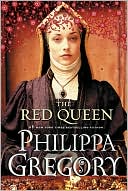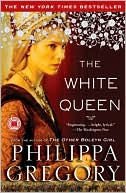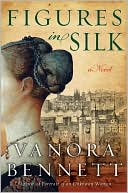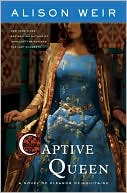Innocent Traitor: A Novel of Lady Jane Grey
I am now a condemned traitor . . . I am to die when I have hardly begun to live.\ Historical expertise marries page-turning fiction in Alison Weir’s enthralling debut novel, breathing new life into one of the most significant and tumultuous periods of the English monarchy. It is the story of Lady Jane Grey–“the Nine Days’ Queen”–a fifteen-year-old girl who unwittingly finds herself at the center of the religious and civil unrest that nearly toppled the fabled House of Tudor during the...
Search in google:
I am now a condemned traitor . . . I am to die when I have hardly begun to live.Historical expertise marries page-turning fiction in Alison Weir’s enthralling debut novel, breathing new life into one of the most significant and tumultuous periods of the English monarchy. It is the story of Lady Jane Grey–“the Nine Days’ Queen”–a fifteen-year-old girl who unwittingly finds herself at the center of the religious and civil unrest that nearly toppled the fabled House of Tudor during the sixteenth century.The child of a scheming father and a ruthless mother, for whom she is merely a pawn in a dynastic game with the highest stakes, Jane Grey was born during the harrowingly turbulent period between Anne Boleyn’s beheading and the demise of Jane’s infamous great-uncle, King Henry VIII. With the premature passing of Jane’s adolescent cousin, and Henry’s successor, King Edward VI, comes a struggle for supremacy fueled by political machinations and lethal religious fervor. Unabashedly honest and exceptionally intelligent, Jane possesses a sound strength of character beyond her years that equips her to weather the vicious storm. And though she has no ambitions to rule, preferring to immerse herself in books and religious studies, she is forced to accept the crown, and by so doing sets off a firestorm of intrigue, betrayal, and tragedy.Alison Weir uses her unmatched skills as a historian to enliven the many dynamic characters of this majestic drama. Along with Lady Jane Grey, Weir vividly renders her devious parents; her much-loved nanny; the benevolent Queen Katherine Parr; Jane’s ambitious cousins;the Catholic “Bloody” Mary, who will stop at nothing to seize the throne; and the protestant and future queen Elizabeth. Readers venture inside royal drawing rooms and bedchambers to witness the power-grabbing that swirls around Lady Jane Grey from the day of her birth to her unbearably poignant death. Innocent Traitor paints a complete and compelling portrait of this captivating young woman, a faithful servant of God whose short reign and brief life would make her a legend.“An impressive debut. Weir shows skill at plotting and maintaining tension, and she is clearly going to be a major player in the . . . historical fiction game.”–The Independent“Alison Weir is one of our greatest popular historians. In her first work of fiction . . . Weir manages her heroine’s voice brilliantly, respecting the past’s distance while conjuring a dignified and fiercely modern spirit.”–London Daily MailFrom the Hardcover edition.The Washington Post - Ron CharlesYou can't resist Jane -- so young, so brilliant, so cruelly used and sacrificed. In the nine days' queen, Weir has found a fascinating and deeply sympathetic figure through which to examine one of the strangest crises of British history.
Frances Brandon, Marchioness of Dorset\ Bradgate Hall, Leicestershire, October 1537\ My travail begins as I am enjoying a walk in the garden. There is a sudden flood of liquid from my womb, and then, as my maid runs for cloths and assistance, a dull pain that shifts from the small of my back to the pit of my stomach. Soon, they are all clustering around me, the midwives and the women, helping me through the great doorway of the manor house and up the oaken stairs, stripping me of my fine clothing and replacing it with a voluminous birthing smock of bleached linen, finely embroidered at the neck and wrists. Now I am made to lie upon my bed, and they are pressing a goblet of sweet wine to my lips. I don’t really want it, but I take a few sips to please them. My two chief ladies sit beside me, my gossips, whose job it is to while away the tedious hours of labor with distracting chatter. Their task is to keep me cheerful and to offer encouragement when the pains grow stronger.\ And they do grow stronger. Less than an hour passes before the dull ache that accompanies each pang becomes a knifelike thrust, vicious and relentless. Yet I can bear it. I have the blood of kings in my veins, and that emboldens me to lie mute, resisting the mounting screams. Soon, God willing, I will hold my son in my arms. My son, who must not die early like the others, those tiny infants who lie beneath the flagstones of the parish church. Neither lived long enough even to sit or crawl. I do not account myself a sentimental person; indeed, I know that many think me too strong and hard-willed for a woman—a virago, my husband once said, during one of our many quarrels. But hidden within my heart there is a raw place reserved for those two lost babies.\ Yet it is natural that this third pregnancy has often led me to revisit this secret place, to disturb and probe it gently, testing to see if past trage- dies still have the power to hurt. I know I should forbid myself such weakness. I am King Henry’s niece. My mother was a princess of England and Queen of France. I must face the pain of my loss as I do my labor—with royal dignity, refusing to indulge any further in morbid fancies, which, I am assured by the midwives, could well be harmful to the child I carry. One must try to be positive, and I am nothing if not an optimist. This time, I feel it in my bones, God will give us the son and heir we so desperately desire.\ Another hour passes. There is little respite between each contraction, but the pain is still bearable.\ “Cry out if you need to, my lady,” says the midwife comfortingly, as the women fuss round me with candles and basins of water. I wish they would all go away and leave me in peace. I wish they would let some fresh air into this fetid, stuffy chamber. Even though it is day, the room is dark, for the windows have been covered with tapestries and painted cloths.\ “We must not risk the babe catching any chills from drafts, my lady,” the midwife warned me when she ordered this to be done. Then she personally inspected the tapestries to ensure that there was nothing depicted in them that could frighten the child.\ “Make up the fire!” she instructs her acolytes, as I lie here grappling with my pains. I groan; it’s hot enough in here already, and I am sweating like a pig. But, of course, she is aware of that. At her nod, a damp cloth is laid on my brow. It does little to relieve my discomfort, though, for the sheets are wet with perspiration.\ I stifle another groan.\ “You can cry out, madam,” the midwife says again. But I don’t. I would not make such an exhibition of myself. Truly, it’s the indignity of it all that bothers me the most, conscious as I am of my birth and my rank. Lying here like an animal straining to drop its cub, I’m no different from any common jade who gives birth. There’s nothing exalted about it. I know it’s blasphemy to say this, but God was more than unfair when He created woman. Men get all the pleasure, while we poor ladies are left to bear the pain. And if Henry thinks that, after this, I’m going to . . .\ Something’s happening. Dear God, what’s going on? Sweet Jesus, when is this going to end?\ The midwife draws back the covers, then pulls up my shift to expose my swollen, straining body, as I lie on the bed, knees flexed, thighs parted, and thrusts expert fingers inside me. She nods her head in a satisfied way.\ “If I’m not mistaken, this young lad is now in something of a hurry,” she tells my anxiously hovering ladies.\ “Ready now!” she crows triumphantly. “Now push, my lady, push!”\ I gather all my strength, breathe deeply, and exhale with a great effort, knowing that an end is in sight. I can feel the child coming! I ram my chin into my chest again and push as I am instructed, hard. And the miracle happens. In a rush of blood and mucus, I feel a small, wet form slithering from me. Another push, and it is delivered into the midwife’s waiting hands, to be quickly wrapped in a rich cloth of damask. I glimpse its face, which resembles a wrinkled peach. I hear the mewling cry that tells me it lives.\ “A beautiful daughter, my lady,” announces the midwife uncertainly. “Healthy and vigorous.”\ I should be joyful, thanking God for the safe arrival of a lusty child. Instead, my spirits plummet. All this—for nothing.\ Queen Jane Seymour\ Hampton Court Palace, Surrey, October 1537\ It has begun, this labor that I, the King my husband, and all England have so eagerly awaited. It began with a show of blood, then the anxious midwives hurried me into bed, fearful in case anything should go wrong. Indeed, every precaution has been taken to guard against mishap. Since early summer, when the babe first fluttered in my womb and I appeared in public with my gown unlaced, prayers have been offered up throughout the land for my safe delivery. My husband engaged the best physicians and midwives and paid handsomely to have the soothsayers predict the infant’s sex: all promised confidently that it would be a boy, an heir to the throne of England. Henry insisted that I be spared all state appearances, and I have spent these past months resting in opulent idleness, my every whim and craving gratified. He even sent to Calais for the quails I so strongly fancied. I ate so many I sickened of them.\ Most pregnant women, I am told, sink into a pleasant state of euphoria as their precious burden grows heavier, as if Nature is deliberately affording them a short respite before the ordeal that lies ahead and the responsibilities of motherhood that follow it. But I have enjoyed no such comforting sense of well-being or elation at the glorious prospect fac- ing me, God willing. My constant companion is fear. Fear of the pain of labor. Fear of what will happen to me if I bear a girl or a dead child, as my two unfortunate predecessors did. Fear of my husband, who, for all his devotion and care for me, is still a man before whom even strong men tremble. How he could ever have settled his affections on such a poor, plain thing as I is beyond my limited comprehension. My women, when they dare mention the subject, whisper that he loves me because I am the very antithesis of Anne Boleyn, that black-eyed witch who kept him at bay for seven years with promises of undreamed-of carnal adventures and lusty sons, yet failed him in both respects once he had moved Heaven and earth to put the crown on her head. I cannot think about what he did to Anne Boleyn. For even though she was found guilty of betraying him with five men, one her own brother, it is horrifying to know that a man is capable of cutting off the head of a woman he has held in his arms and once loved to distraction. And it is even more horrifying when that man is my husband.\ So I live in fear. Just now I am terrified of the plague, which rages in London so virulently that the King has given orders that no one from the city may approach the court. Confined to my chamber for the past six weeks, as is the custom for English queens, with only women to wait on me and the imminent birthing to brood on, I am prey to all kinds of terrors, so in a way it is a relief now to have something real upon which to focus my anxieties.\ Henry is not here. He has gone hunting, as is his wont and passion, although he has given me his word that he will not ride more than sixty miles from here. I would be touched by his concern had I not learned that it was his council that advised him not to stray farther from me at this time. But I am glad, all the same, that he has gone. He would be just one more thing to worry about. His obsessive and pathetic need for this child to be a boy is more than I can cope with.\ It is now afternoon, and my pains are recurring with daunting intensity, even though the midwife tells me that it will be some hours yet before the child can be born. I pray God that this ordeal may soon be over, and that He will send me a happy hour, for I do not think I can stand much more of this.\ From the Hardcover edition.
\ From Barnes & NobleIn her first historical novel, popular royal biographer Alison Weir cunningly places the short-lived Lady Jane Grey (1537-54) at the heart of a fiction with haunting similitude. Real personages, including Henry VIII, Prince Edward, and the ill-fated Anne Boleyn, people this tale of religious strife and court intrigues. An auspicious fiction debut.\ \ \ \ \ Ron CharlesYou can't resist Jane -- so young, so brilliant, so cruelly used and sacrificed. In the nine days' queen, Weir has found a fascinating and deeply sympathetic figure through which to examine one of the strangest crises of British history.\ — The Washington Post\ \ \ Publishers WeeklyPopular biographer Weir (Eleanor of Aquitaine, etc.) makes her historical fiction debut with this coming-of-age novel set in the time of Henry VIII. Weir's heroine is Lady Jane Grey (1537-1554), whose ascension to the English throne was briefly and unluckily promoted by opponents of Henry's Catholic heir, Mary. As Weir tells it, Jane's parents, the Marquess and Marchioness of Dorset, groom her from infancy to be the perfect consort for Henry's son, Prince Edward, entrusting their daughter to a nurse's care while they attend to affairs at court. Jane relishes lessons in music, theology, philosophy and literature, but struggles to master courtly manners as her mother demands. Not even the beheadings of Anne Boleyn and Katherine Howard deter parental ambition. When Edward dies, Lord and Lady Dorset maneuver the throne for their 16-year-old daughter, risking her life as well as increased violence between Protestants and Catholics. Using multiple narrators, Weir tries to weave a conspiratorial web with Jane caught at the center, but the ever-changing perspectives prove unwieldy: Jane speaking as a four-year-old with a modern historian's vocabulary, for example, just doesn't ring true. But Weir proves herself deft as ever describing Tudor food, manners, clothing, pastimes (including hunting and jousting) and marital politics. (Mar.) Copyright 2006 Reed Business Information.\ \ \ \ \ Library JournalHistorian Weir has written ten biographies about the British monarchy. In her first novel, she tells the tragic story of Lady Jane Grey, who was the great-niece of Henry VIII and who reigned for nine days in 1553. Jane's parents, the Duke and Duchess of Suffolk, were ruthless in their political ambitions, and the author portrays them as abusive toward the precocious, intelligent, and pious Jane. Jane's happiest days were spent in the household of the Dowager Queen Katherine Parr, Henry VIII's sixth wife. Henry's son and heir, Edward VI, was a sickly nine-year-old when he was crowned upon Henry's death. Edward's sisters Mary (a devout Catholic) and Elizabeth (whose alliance was uncertain) were declared illegitimate. Jane, the avowed Protestant, was declared the next in line and at age 15 accepted the crown. Within days, the balance of power tilted to the Catholics, and Jane was dethroned and imprisoned by the newly crowned Queen Mary; she was beheaded in February 1554. Weir keeps a complicated story untangled with the deft use of multiple first-person points of view. The recording enhances the technique by using varied clear-voiced narrators. Highly recommended for fiction collections.\ —Nann Blaine Hilyard\ \ \ \ \ \ Library JournalThis first novel by British historian Weir (The Life of Elizabeth I), who addresses the life of Lady Jane Grey, is a treat for fans of meaty historical fiction. Well written and researched, it succeeds as a thoroughly involving novel by bringing a disparate, sympathetic group of characters to life. Lady Jane, known to history as the Nine Days Queen, is a tragic and appealing figure. Abused by her parents, this talented and intelligent girl was bullied into a hateful marriage and pushed into accepting the Crown after the death of King Edward VI. Edward's older sister, Princess Mary (later known as Bloody Mary, and for good reason), rightfully claimed the Crown as her own, and Jane was sent to the Tower of London and eventually executed. Weir tells the story of Jane's short life from multiple viewpoints, which might initially confuse readers unfamiliar with the history, but this is a small fault in an otherwise entertaining and moving novel. Sure to be popular with those who enjoy the works of Philippa Gregory (The Other Boleyn Girl), this London Times best seller is highly recommended for all public libraries.-Elizabeth M. Mellett, P.L. of Brookline, MA Copyright 2006 Reed Business Information.\ \ \ \ \ School Library JournalAdult/High School\ Weir ventures into fiction with this story. In the prologue, Jane is stunned that her trial is over and that she has been convicted of treason, a capital offense. The novel then begins with her birth, a sore disappointment to her ambitious parents who desperately yearned for a son. Various narrators describe the events and fill in the historical background in alternating chapters. Jane is a bright and quick child, but does not enjoy some of the robust activities, such as hunting, associated with her station in society (her mother is the niece of King Henry VIII). For teens, Jane's will be the most compelling voice as she recounts the callousness of her mother, especially compared to the love and support from her nurse, Mrs. Ellen; the idyllic time she spends with the widowed Queen Katherine Parr while plans are made for Jane to marry the young King Edward; then her unsatisfying marriage to Guildford and its brutal consummation. Jane, who has adopted the Protestant faith, is pushed into the line of succession (since Henry VIII was her great-uncle) by those who fear England's return to Catholicism. Readers who enjoyed Philippa Gregory's The Other Boleyn Girl (2002) or The Constant Princess (2005, both Touchstone) will be drawn to Jane's quiet strength of character as she is used by her parents for their advancement and is condemned to pay the ultimate price.-Teri Titus, San Mateo County Library, CA\ Copyright 2006 Reed Business Information.\ \ \ \ \ Kirkus ReviewsWeir's erudition in matters royal finds fictional expression in the story of England's briefest reigning sovereign, Lady Jane Grey. Lady Jane is often viewed as merely pathetic. Who better to rehabilitate her than Weir (Queen Isabella, 2005, etc.), author of numerous works of popular history, five of which concern the Tudor dynasty. In setting her first novel around Lady Jane, daughter of Henry VIII's niece, Frances, Weir must surmount two major historical constraints; first, that Jane's fate is known, and second, that Jane, though precocious and unusually well-schooled for a girl of the time, is a necessarily passive character. A minor throughout, Jane is subject to the whims of corrupt and ambitious adults bent on exploiting her bloodline to advance their own agenda. A Tudor Mommie Dearest, Frances hardens her heart against Jane for failing to be born male. Frances brutally punishes her on the slightest pretext, and Jane is happy to escape to the household of Queen Katherine Parr, King Henry's sixth wife. After Katherine's death, Jane narrowly escapes getting caught up in the doomed machinations of the Seymours, protectors of boy-king Edward VI. Frances' plan to betroth Jane to Edward fizzles. The Seymours' replacement, the Duke of Northumberland, seeks to circumvent Henry's will, which provides for the succession of princesses Mary and Elizabeth. As Edward lies dying of consumption exacerbated by a little arsenic, the Duke prompts him to name Jane as his successor. Jane at first refuses the crown, but, a devout Protestant, she's persuaded that the accession of Mary would mean the country's reversion to Catholicism. Jane reigns for nine days, but her court evaporates when Mary musters alarge army. Now Queen, Mary is loath to execute 16-year-old Jane, but succumbs to pressure from her Catholic allies. Jane has one chance to escape the headsman: Convert to Catholicism. But although Protestants don't have saints, they have martyrs, and Jane, in the end, is determined to be one. An affecting portrayal.\ \








